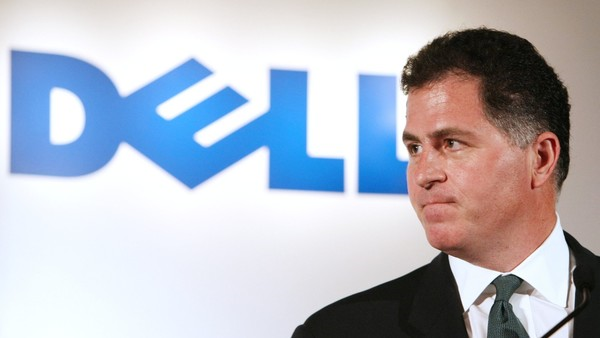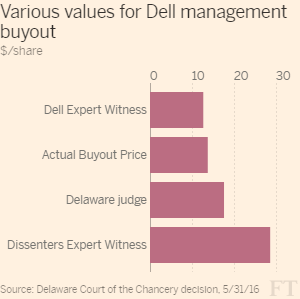|

|
Chairman and chief executive Michael Dell |
©Bloomberg |
|
In
New York, mergers and acquisitions are the province of investment
bankers with slicked-back hair and polished wingtips. But, if a deal
price does not meet with universal cheers, the battlefield often
shifts from a Manhattan conference room to a Delaware courtroom
because US companies are domiciled in that state. There, the focus
suddenly shifts to egghead professors sporting pocket protectors who
offer competing, and often different, calculations of how much a
company is worth.
In
one closely watched case
decided two weeks ago, the
focus was on the technology company, Dell, which was taken private by
founder Michael Dell in 2013. Some investors believed they had been
short-changed, so they challenged the price in what has become known
as an “appraisal” case.
Once an
obscure quirk of Delaware law, appraisal has become a key remedy for
shareholders and a tool for opportunistic hedge funds. When a company is
sold for cash, unhappy stockholders can exercise so-called “dissenters”
rights and ask a judge to assign a new value for their shares. This
court-determined price can be higher than the deal price or lower. But, in
many cases, it turns out to be the same because judges opt to defer to the
deal.
It can be
reached in a less rounded way, however.
When
bankers advise company boards about what would constitute an acceptable
buyout price, they often present a series of different calculations on a
grid. A premiums analysis shows how much recent deals exceeded market
trading prices. A “capitalised” earnings calculation applies a
multiplication factor to an earnings forecast. Another approach involves
adding up future cash flows and discounting them to reach a fair value
today. For bankers, valuation is the painting of an intricate mosaic.
Alas, the
Delaware court is often less nuanced. Although the appraisal statute has
been interpreted to allow judges to choose whatever valuation method(s) they
deem appropriate, in virtually all recent cases — including Dell — the court
has relied solely on discounted cash flow. “The DCF valuation methodology
has featured prominently [because it] merits the greatest confidence within
the financial community,” the court has said. DCF also happens to be the
favoured approach of scholars because of its theoretical elegance: an
asset’s value should strictly be equal to the net cash it generates.
In the Dell
dispute, the company’s expert witness was noted Columbia Business School
economist Glenn Hubbard, best known for advising Republican politicians.
Dell’s shareholders, seeking a higher price, retained Bradford Cornell of
Caltech, the university that is home to Nasa’s rocket laboratory. They are
among around a dozen valuation experts who can bill $1,000 per hour for
their services, and work as affiliates of litigation consultancies — the
best known being Analysis Group, Charles River Associates, Compass Lexecon
and NERA. They are not formal employees but get to use the firms’ resources
— notably an army of spreadsheet jockeys to do the supporting maths.
Despite the
Delaware court’s confidence in DCF, the Dell expert’s use of it proved
contentious. Dr Hubbard’s DCF, for the Dell side, computed that the company
was worth $12.68 per share, suggesting that the $13.75 per share buyout
price was a magnificent win for shareholders. Mr. Cornell, for the
dissenters, concluded Dell was worth a wild $28.61 per share. As the judge
wryly noted, this implied a $28bn aggregate valuation difference on a buyout
worth only $25bn. Still, the judge thought the differences on their inputs
to the calculations — profits, debt and equity levels, discount rates, cash
adjustments — were all arrived at in good faith. So he cherry-picked the
bits of each professor’s work that he found most defensible, to reach a
valuation of $17.62 per share.
It seems
the court is aware of the peril in this approach, writing in an earlier
case: “The value of a corporation is not a point on a line, but a range of
reasonable values, and the judge’s task is to assign one particular value
within this range as the most reasonable value in light of all the relevant
evidence and based on considerations of fairness.”
Still, such
humility looks hollow when expert witnesses and judges use a single,
fraught, technique. Bankers with their more circumspect, holistic approach
to valuation offer a lesson to the professors and the courts who rely upon
them.
sujeet.indap@ft.com
|
© The Financial Times Ltd 2016 |

